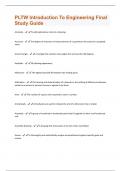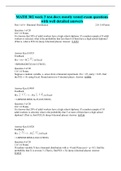Class notes
Comprehensive Lecture Notes: External Relations of the EU (2022/23) – External Representation
- Course
- Institution
Delve into the critical topic of External Representation in the EU’s external relations with this detailed set of lecture notes from the 2022/23 academic year. This bundle covers all the essential areas, including: • Representation Roles (HR/EUCO) • Union Delegates • European Extern...
[Show more]












